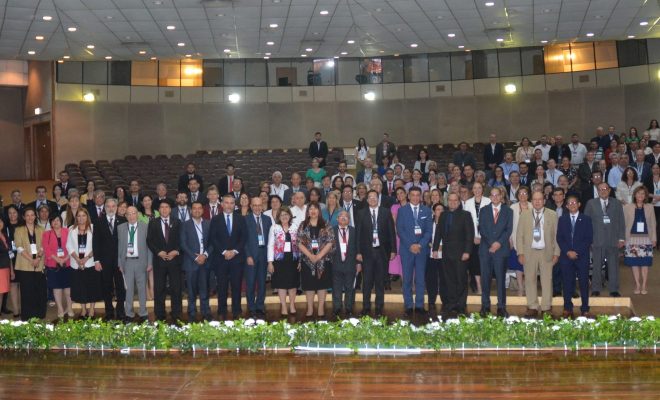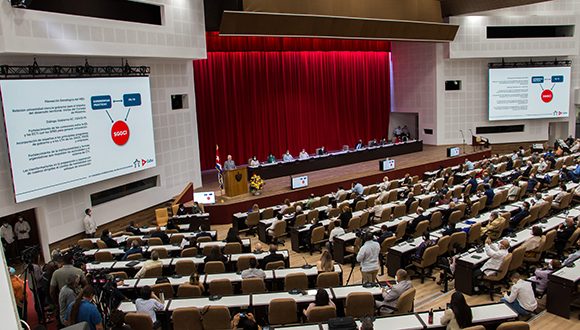Rectors suggest strategic principles for CRES+5

Rectors of the National Association of Directors of Federal Institutions of Higher Education (Andifes: Associação Nacional dos Dirigentes das Instituições Federais de Ensino Superior) presented suggestions for strategic principles to be addressed in the final document of the follow-up event to the Regional Conference on Higher Education in Latin America and the Caribbean 2018 (CRES), entitled CRES+5, which will take place in Brasilia (DF) from March 13 to 15, 2024. The suggestions were made official in the Charter of Brasilia, a document drawn up by Andifes during the “Andifes Seminar: CRES+5 and the future of higher education in Latin America and the Caribbean”, held on November 22 in Brasilia.
The Ministry of Education (MEC), through the Secretariat for Higher Education (Sesu) and the Coordination for the Improvement of Higher Education Personnel (Capes), is responsible for holding the follow-up event to the Conference. It will be promoted by Brazil in partnership with the United Nations Educational, Scientific and Cultural Organization (UNESCO), through the UNESCO International Institute for Higher Education in Latin America and the Caribbean (IESALC).
The event is expected to bring together the higher education community, as well as members of state governments and Brazilian universities. The occasion will also be an opportunity both to disseminate the new public policies of the current MEC administration to other countries and to strengthen dialogue with all the players in higher education in Latin America and the Caribbean.
Suggestions – In view of the higher education scenario in the regional context, Andifes suggests the following strategic principles to be addressed in the final document of CRES+5:
– Reiterate the basic principles established by CRES+5: higher education is a public good, a human and universal right, a right for all and a duty of States;
– Vehemently express the region’s position against the commercialization of higher education;
– Emphasize the importance of university autonomy so that higher education institutions in the region can fulfill their institutional mission, meeting the demands of society;
– Reaffirm the importance for the region of the continued defense of democracy and education for democratic construction;
– Emphasize the need to combine the quality of higher education with inclusion and permanence;
– Highlight extension as an essential pillar of higher education and an integral part of the educational system in Latin America and the Caribbean;
– Express the importance of funding for public higher education and funding for internationalization;
– Reiterate the view that internationalization cannot be seen as a form of neo-colonization, but rather as a possibility for decolonial thinking and understanding between peoples, which is essential for guaranteeing human rights, full citizenship and integration in solidarity;
– Emphasize solidarity and cooperation networks between institutions and countries in the region;
– Analyze Latin America’s experience in confronting Covid-19, with profound consequences and also lessons for teaching, research, extension and scientific culture;
– Reinforce the importance of higher education for environmental sustainability and for the social and economic development of countries in the region;
– Strengthen policies for the revalidation of degrees for professional and academic mobility, as well as academic recognition mechanisms that facilitate mobility in training paths;
– Promote multilingualism through policies for teaching Spanish, Portuguese and other languages of the region, including minority languages;
– Strengthen the principle of trust and reciprocity between education systems in the Global South;
– Highlight the internationalization of higher education as a means of forming a shared Latin American socio-historical identity and regional citizenship.
CRES+5 – One of the commitments made at the 3rd Regional Conference on Higher Education in Latin America and the Caribbean (CRES 2018), held in Córdoba (Argentina), was to hold a follow-up meeting five years later, CRES+5. The proposal is to promote a participatory process to highlight the progress made, the challenges that remain and the emerging issues, particularly in the post-pandemic phase. At CRES 2018, a Declaration was approved and an ambitious Work Plan was established for the period 2018-2028.
The action plan created at CRES 18 has a number of guidelines, including: the strategic role of higher education in the sustainable development of Latin America and the Caribbean; higher education, cultural diversity, interculturality, internationalization and regional integration in Latin America; scientific and technological research and innovation as a driver of human, social and economic development for Latin America and the Caribbean; and teacher training.
In addition to the seven thematic axes around which CRES 2018 revolved, the First Preparatory Meeting for CRES+5 – held in March, 2023 in Córdoba, Argentina – defined and added new axes to coordinate and guide the regional debates on the next five years. For each thematic axis, the creation of a Working Group made up of experts was approved.
More information on the thematic axes is available on IESALC’s website
Article written by the Social Communication Office of the MEC, with information from Andifes / Categories: Education and Research
Leave a reply
You must be logged in to post a comment.








